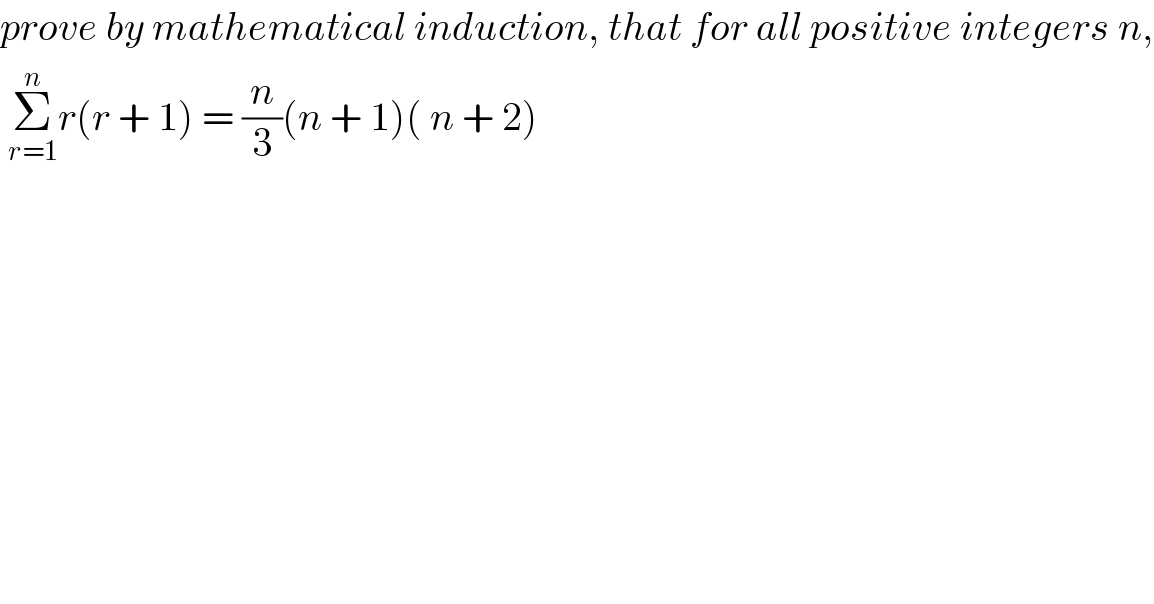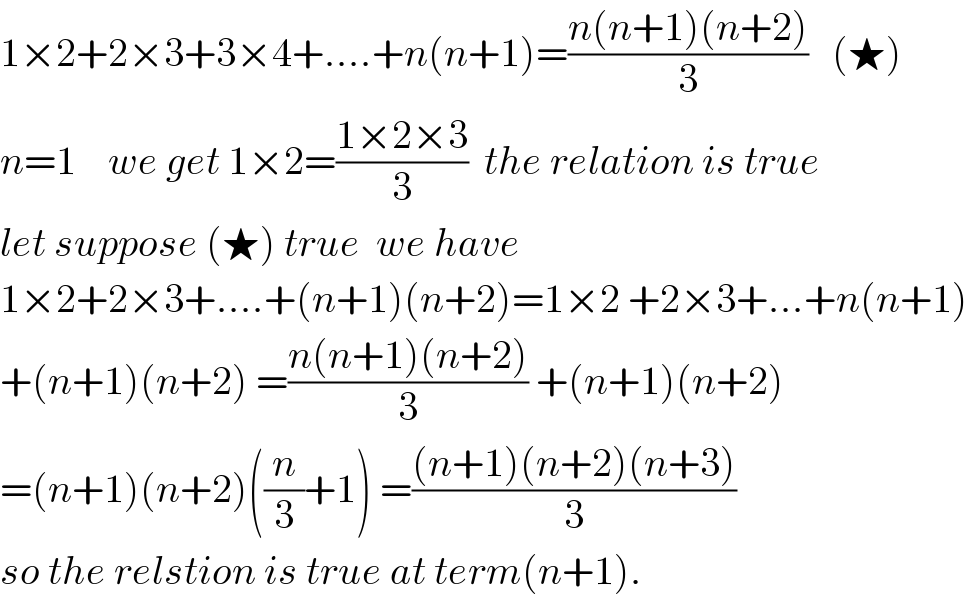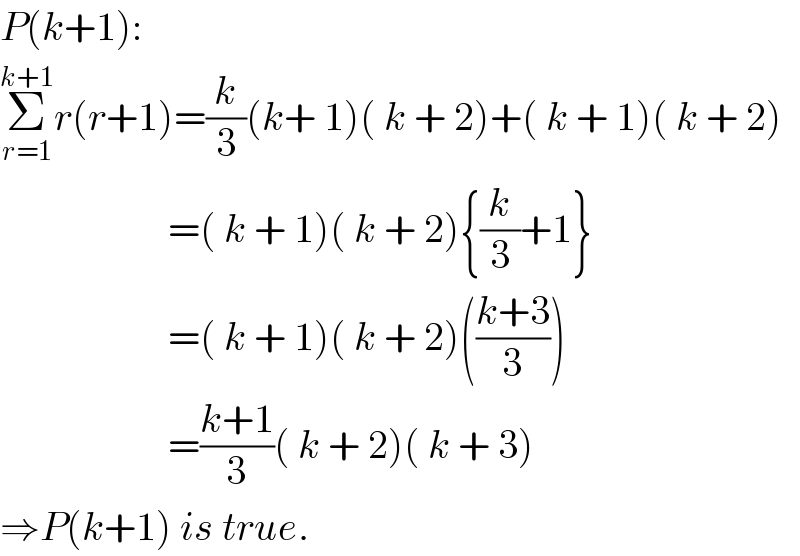
Question Number 69762 by Rio Michael last updated on 27/Sep/19

$${prove}\:{by}\:{mathematical}\:{induction},\:{that}\:{for}\:{all}\:{positive}\:{integers}\:{n}, \\ $$$$\:\underset{{r}=\mathrm{1}} {\overset{{n}} {\sum}}{r}\left({r}\:+\:\mathrm{1}\right)\:=\:\frac{{n}}{\mathrm{3}}\left({n}\:+\:\mathrm{1}\right)\left(\:{n}\:+\:\mathrm{2}\right) \\ $$
Commented by mathmax by abdo last updated on 27/Sep/19

$$\mathrm{1}×\mathrm{2}+\mathrm{2}×\mathrm{3}+\mathrm{3}×\mathrm{4}+....+{n}\left({n}+\mathrm{1}\right)=\frac{{n}\left({n}+\mathrm{1}\right)\left({n}+\mathrm{2}\right)}{\mathrm{3}}\:\:\:\left(\bigstar\right) \\ $$$${n}=\mathrm{1}\:\:\:\:{we}\:{get}\:\mathrm{1}×\mathrm{2}=\frac{\mathrm{1}×\mathrm{2}×\mathrm{3}}{\mathrm{3}}\:\:{the}\:{relation}\:{is}\:{true} \\ $$$${let}\:{suppose}\:\left(\bigstar\right)\:{true}\:\:{we}\:{have} \\ $$$$\mathrm{1}×\mathrm{2}+\mathrm{2}×\mathrm{3}+....+\left({n}+\mathrm{1}\right)\left({n}+\mathrm{2}\right)=\mathrm{1}×\mathrm{2}\:+\mathrm{2}×\mathrm{3}+...+{n}\left({n}+\mathrm{1}\right) \\ $$$$+\left({n}+\mathrm{1}\right)\left({n}+\mathrm{2}\right)\:=\frac{{n}\left({n}+\mathrm{1}\right)\left({n}+\mathrm{2}\right)}{\mathrm{3}}\:+\left({n}+\mathrm{1}\right)\left({n}+\mathrm{2}\right) \\ $$$$=\left({n}+\mathrm{1}\right)\left({n}+\mathrm{2}\right)\left(\frac{{n}}{\mathrm{3}}+\mathrm{1}\right)\:=\frac{\left({n}+\mathrm{1}\right)\left({n}+\mathrm{2}\right)\left({n}+\mathrm{3}\right)}{\mathrm{3}} \\ $$$${so}\:{the}\:{relstion}\:{is}\:{true}\:{at}\:{term}\left({n}+\mathrm{1}\right). \\ $$
Answered by $@ty@m123 last updated on 27/Sep/19

$${P}\left({k}+\mathrm{1}\right): \\ $$$$\underset{{r}=\mathrm{1}} {\overset{{k}+\mathrm{1}} {\sum}}{r}\left({r}+\mathrm{1}\right)=\frac{{k}}{\mathrm{3}}\left({k}+\:\mathrm{1}\right)\left(\:{k}\:+\:\mathrm{2}\right)+\left(\:{k}\:+\:\mathrm{1}\right)\left(\:{k}\:+\:\mathrm{2}\right) \\ $$$$\:\:\:\:\:\:\:\:\:\:\:\:\:\:\:\:\:\:\:\:\:=\left(\:{k}\:+\:\mathrm{1}\right)\left(\:{k}\:+\:\mathrm{2}\right)\left\{\frac{{k}}{\mathrm{3}}+\mathrm{1}\right\} \\ $$$$\:\:\:\:\:\:\:\:\:\:\:\:\:\:\:\:\:\:\:\:\:=\left(\:{k}\:+\:\mathrm{1}\right)\left(\:{k}\:+\:\mathrm{2}\right)\left(\frac{{k}+\mathrm{3}}{\mathrm{3}}\right) \\ $$$$\:\:\:\:\:\:\:\:\:\:\:\:\:\:\:\:\:\:\:\:\:=\frac{{k}+\mathrm{1}}{\mathrm{3}}\left(\:{k}\:+\:\mathrm{2}\right)\left(\:{k}\:+\:\mathrm{3}\right) \\ $$$$\Rightarrow{P}\left({k}+\mathrm{1}\right)\:{is}\:{true}. \\ $$
Commented by Rio Michael last updated on 27/Sep/19

$${wait}\:{sir}\left[{if}\:\:{p}\left({k}\:+\:\mathrm{1}\right)\:{is}\:{true}\:{do}\:{we}\:{end}\:{there}?\right. \\ $$
Commented by $@ty@m123 last updated on 28/Sep/19

$${No}. \\ $$$${I}\:{have}\:{done}\:{the}\:{difficult}\:{part}\:{only}. \\ $$$${I}\:{asumed}\:{you}\:{can}\:{do}\:{the}\:{rest}. \\ $$
Commented by Rio Michael last updated on 28/Sep/19

$${thanks} \\ $$
